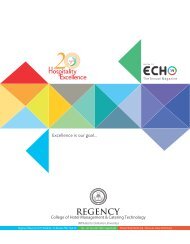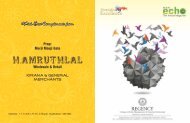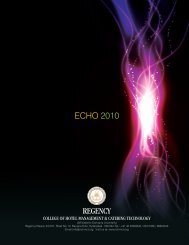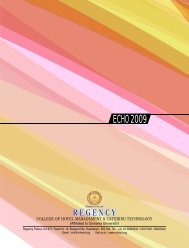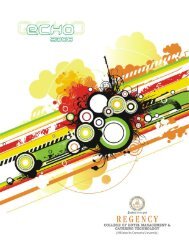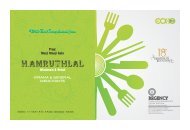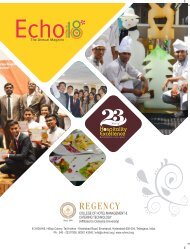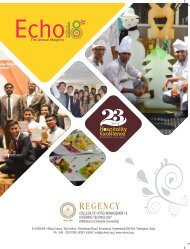ECHO 2016 COLLEGE MAGAZINE
Create successful ePaper yourself
Turn your PDF publications into a flip-book with our unique Google optimized e-Paper software.
peer speak<br />
Rohith Ravuri, 1st year BHMCT<br />
Tips and tricks while cooking<br />
• To retain the white color of Cauliflower<br />
Add a tbsp of milk while cooking cauliflower.<br />
• To get fluffy rice<br />
Add a tbsp of fresh lemon juice or oil while<br />
cooking rice to get fluffy and white grains.<br />
• How to store leftover chapatti dough<br />
Store leftover dough in the refrigerator in an<br />
air tight container after applying a little oil<br />
over it to prevent it from drying.<br />
Sprinkle water over the rice and then reheat<br />
it to get softer.<br />
• To prevent tears while chopping onions<br />
Cut off both ends, peel the onions and wash<br />
the onions under cold water.<br />
• To retain the green color of peas;<br />
Add a pinch of sugar when boiling green<br />
peas to retain their green colour.<br />
• For easy digestion ;<br />
Add a pinch of hing when cooking any dhal,<br />
legumes, potato or any dish to aid in<br />
digestion.<br />
• For perfect cooking;<br />
When a curry or gravy is kept in pan in a<br />
simmer, just cover it with a lid and pour<br />
some water on top of the lid. So that the<br />
gravy or curry which is in pan doesn’t stick<br />
the bottom.<br />
Raghavendra, 1st year BHMCT<br />
Vegetables Hurt Ecology More Than Meat<br />
A study claims growing vegetables require more resources than live stock.<br />
In a striking new study, vegetarian foods are considered to be more harmful<br />
to the environment than non-vegetarian.<br />
Lettuce (vegetable) is “over three times worse in green house gas emissions<br />
than eating bacon(processed meat)”according to researchers from the<br />
Carnegie Mellon university ,United States, who analyzed the impact per<br />
calorie water use and emissions published in the environment systems and<br />
decisious journal, the study goes against the grain of recent calls for<br />
humans to quit eating meat to curb climate change.<br />
Researchers did not argue against the idea people should be eating less<br />
meat or the fact that live stock contributes to an enormous proportional of<br />
global emissions – up to 51 percent according to some studies, but found that<br />
eating only the recommended foods prescribed in recent advice from the US<br />
department of agriculture increased a precious impact on the environment<br />
across all three factors even over all calorie intake was reduced. The experts<br />
examined how growing, processing and transporting food; sales and<br />
services; and house hold storage and use all took a toll on environment for<br />
different foods.<br />
Paul Fischbeck , study co- author and CMU’s professor of social and<br />
decisious sciences said, “Lots of common vegetables require more<br />
resources per calorie than what you think”. “Egg plant, Celery and<br />
Cucumbers look particularly bad when compared to pork or chicken”, he<br />
said. According to the authors, the study analyzed the impact on the<br />
environment from changing the average US diet to three new “dietary<br />
scenarios”.Simply reducing the number of calorie consumed, without<br />
changing the proportion of meat and other food types , cut combined<br />
emissions , energy and water by around 9 %. Perhaps understandably<br />
maintaining calorie intake but completely shifting to healthy foods increased<br />
energy by 43%, water by 16% and emissions by 11%.<br />
V. Ganesh<br />
V. Gyaneshwar<br />
Call : 93477 33661<br />
96030 13030, 040-24516549<br />
Ganesh & Co.<br />
WHOLESALE VEGETABLE SUPPLIERS<br />
MARRIAGE & ALL TYPES<br />
OF FUNCTIONS<br />
58 <strong>ECHO</strong> - <strong>2016</strong><br />
Madannapet Market,<br />
Saidabad, Hyd - 59






